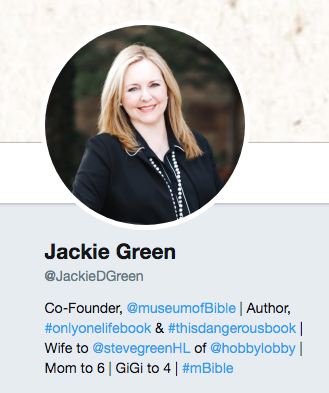On Good Government & Good Girls: How the Museum of the Bible's Founding Family Turned Themselves into Bible Experts
They bought artifacts. They bought a building. What the Green family bought ultimately was expertise.

Steve Green in the basement of the Washington Design Center, which had recently been demolished as part of the construction for the Museum of the Bible. (The Washington Post via Getty Images.)
Opened in late 2017 near the National Mall in Washington, D.C., the Museum of the Bible (MOTB) has alternately been a source of celebration or consternation among Bible experts nationwide. The museum has been mired in controversy for attempting to fuse evangelical Christian funding with a “non-sectarian” mission, being connected to illegal antiquities smuggling, and displaying forged Dead Sea Scrolls. The MOTB continues to draw attention not only from the popular press but also from biblical scholars, some of whom have been involved as advisors.
While the MOTB was once conceived as a missionary tool, in recent years the organization has presented itself principally as an educational and research institution that does not privilege any particular religious community. Many critics, including the present authors, have argued that despite MOTB leadership’s attempts to make it a “neutral” institution, the museum actually offers an evangelical understanding of the Bible. One might not be surprised, given that the principal funders and founders of the MOTB are the Green family, owners of craft store chain Hobby Lobby—well known for their evangelical beliefs and conservative political activism. Probably most famous for their Supreme Court victory against the Affordable Care Act’s contraception mandate in the U.S. Supreme Court case Burwell v. Hobby Lobby (2014), they now are up to more with the MOTB in tow.
In order to contextualize the MOTB in our present political moment, we must pay attention not only to what is in the museum or to the question of whether the MOTB is or can become “non-sectarian.” We must also be attuned to what is happening outside the museum walls. And, as we show in what follows, there is no question that the Greens are using the MOTB to make sectarian religious and political claims on the basis of the Bible. The MOTB as an institution is doing more than merely opening its doors to receive visitors interested in the Bible. It is also quietly supporting a new way to produce and legitimize claims of biblical expertise.
The Green family is using their patronage of the MOTB to authorize themselves as biblical interpreters in political and religious spheres, avoiding traditional forms of credentialing from church institutions or academic training.
While it might seem strange for the Greens to use philanthropy to make themselves biblical experts, such a project is the natural outgrowth of several trends within American evangelicalism. Evangelicals, like the early Protestant reformers, have long conceptualized the Bible as being able to speak directly to the individual believer, skirting officially sanctioned and trained church mediators. For some, this has created what Molly Worthen has called a “crisis of authority,” in which religious interpretations are validated through non-institutional mechanisms.
As the owners of a successful business, furthermore, the Greens are perceived by proponents of the Prosperity Gospel (a major segment of American Christianity) as uniquely blessed by God. As rich Christians who have used their wealth to support evangelical causes, the Greens have long been recognized as leaders within the evangelical movement, a fact well-documented by Candida Moss and Joel Baden.
The Green family is now leveraging their identity as “the founding family of the MOTB” to stake claims about the Bible in other spheres. More specifically, the Greens are using their roles in founding the museum as credentials to speak as experts on the Bible. In what follows, we show how various members of the Green family have used their connection to the MOTB to position themselves as experts who can speak authoritatively about the Bible in relation to high-stakes issues like the relationship between church and state, marriage, and gender roles.
***
In June 2018, to the outrage of many, then-attorney general Jeff Sessions invoked Romans 13 to justify the Trump administration’s child separation policy at the United States’ southern border.[1] One week prior to Sessions’ infamous Bible lesson, Michael McAfee, son-in-law to Steve Green and MOTB employee, delivered a speech on this same chapter of Paul’s letter to the Romans. He spoke at the Western Conservative Summit (WCS), an annual conference hosted by the Centennial Institute at Colorado Christian University, at which Sessions was also a featured speaker.
The WCS bills itself as “the largest gathering of conservatives outside of Washington, D.C. . . . All to advance faith, family, and freedom for our future.” The institute says that their mission is to foster the alliance between capitalism and evangelical Christianity and aims “[t]o impact our culture in support of traditional family values, sanctity of life, compassion for the poor, Biblical view of human nature, limited government, personal freedom, free markets, natural law, original intent of the Constitution and Western civilization.”

Michael McAfee speaking at the Western Conservative Summit in 2018
McAfee spoke alongside, in addition to Sessions, scandal-plagued member of the Trump administration, Scott Pruitt, Senator Corey Gardner, the NRA’s Dana Loesch, and the actor Kirk Cameron. He addressed the crowd at the WCS in his official capacity as a representative of the MOTB and was formally introduced as its Director of Community Initiatives. Among his opening words were “I bring you greetings from Museum of the Bible.”
He went on to identify himself as part of the Green family, whom he named as the museum’s “founding family.” His address to the conference was essentially a sermon. He invited audience members to open their Bibles as he framed the question he would seek to answer: “What does the Bible have to say about the government’s role?” Notice three significant unstated premises in McAfee’s question: he assumed that (1) the Bible has one perspective on government; (2) that perspective on government is relevant for the United States today; (3) he is someone qualified to articulate what that perspective is.
None of these premises is self-evident, however.
First, the Bible does not have one perspective on government. The collection of writings now deemed biblical contains a wide range of stories and teachings that speak to how people relate to state power and to how kings, judges, and emperors ought to comport themselves. Romans 13 is just one of many passages to which Christians can look (and have looked) when thinking about government. Romans 13, furthermore, is convoluted. Interpreters disagree on many issues, including whether the rulers Paul mentions are heavenly or earthly entities, what respect and honor he conceives to be due to rulers, how he thinks rulers relate to individual and collective morality, and whether or not the power of rulers is inflected by an expectation of the impending end of time. Because of these ambiguities, Christians have interpreted the passage in myriad ways—a fact about which McAfee seems uninformed. He presented his reading as the reading.
Second, the United States is governed by a representative democracy, a form of government with which ancient biblical authors would have had no experience. The very notion that the Bible has anything to say to citizens of a modern representative democracy needs to be argued for, rather than assumed.
Third, and most important for our purposes, neither the person who introduced McAfee on stage nor McAfee himself named any qualification for his presence and performance other than his affiliation with the MOTB. There are, in fact, several other ways by which McAfee’s participation at CWS could have been explained. He serves, for example, as a teaching pastor at Council Road Baptist Church in Oklahoma City. He is a PhD student in ethics and public policy at the fundamentalist Southern Baptist Theological Seminary. But it was the connection to the MOTB that was leveraged as authorizing him to speak. In other words, McAfee fashioned himself as an authoritative interpreter of the Bible’s relevance for contemporary politics because of his affiliation with the museum.
And what, we might ask, does the Bible say about government, according to the Museum of the Bible’s representative? With slippery use of the first person plural (“we”…Christians? “we”…Americans?), McAfee summarized his argument like this:
“We recognize God has all authority and we want to honor him in all we do. We recognize the United States people have been delegated authority from God to govern ourselves wisely. Third, we honor the government as an act of worship to God. And, fourth, but when the government asks us to violate God’s commands, we must honor God as primary. We must make our own appeal to heaven.”
McAfee went on to celebrate the fight Hobby Lobby won in the Supreme Court against the Affordable Care Act. This was his prime example of a proper Christian “appeal to heaven.”
McAfee’s interpretation of Romans 13, while internally contradictory, is not novel. It was the dominant reading of American revolutionaries, who saw Britain’s government as tyrannical and unjust. McAfee’s assertion that this reading is “what the Bible says” is surprising given that the museum in D.C. has an exhibit that re-stages a debate about obedience versus revolution between Benjamin Franklin and Samuel Seabury. Yet McAfee used his affiliation with the MOTB to assert the reading of Romans 13 that he believes in, rather than highlighting the ways in which people have debated the meaning of this passage.
While speaking as a representative of the MOTB, McAfee not only offered a normative reading of Romans 13, but he also presented the MOTB’s founding family as models for how to follow this “biblical” approach to citizenship and government.
***
Politics is not the only arena in which the Green family is intervening with their newfound biblical “expertise.” Jackie Green and Lauren Green McAfee have recently published a book entitled Only One Life: How a Woman’s Every Day Shapes an Eternal Legacy (Zondervan, 2018). In it, they prescribe fundamentalist gender roles based on their interpretations of the Bible.
As in Michael McAfee’s WCS speech, Jackie Green and Lauren McAfee authorize their biblical interpretations by tying themselves to the MOTB. In fact, the book was launched at the museum and the authors were given a slot in the MOTB’s official speaker series. It is currently featured prominently in the MOTB bookstore. Green and McAfee have also authored a related six-week Bible study for Lifeway, due out in May 2019, for which they have filmed accompanying “video vignettes” inside the D.C. museum. As a result, the museum exhibits will now virtually make their way into churches and Christian homes around the nation in explicit support of the Green family’s biblical interpretations.
Lauren McAfee’s Amazon.com “About the Author” page positions her in relationship to the MOTB: “While pursuing her graduate degrees in pastoral counseling and theology, Lauren worked for her father Steve Green as he founded Museum of the Bible in Washington, DC.” (As the bio goes on to explain, she now works for Hobby Lobby.)
 Jackie Green’s author bio is an even more striking example of how the family’s patronage of the MOTB serves as a credentialing device. On the back of Only One Life we read: “Jackie Green, cofounder of Museum of the Bible with her husband and Hobby Lobby president, Steve Green, is an author, full-time homemaker, mother of six, and grandmother of four.”[2] She is the matriarch of this family, keeper of the home. But the lead identifier—the main qualification that potential readers are presumed to need to know—is her position as cofounder of the museum. (In keeping with the relationship norms celebrated within the pages of this book, she is not identified without also mentioning her husband.)
Jackie Green’s author bio is an even more striking example of how the family’s patronage of the MOTB serves as a credentialing device. On the back of Only One Life we read: “Jackie Green, cofounder of Museum of the Bible with her husband and Hobby Lobby president, Steve Green, is an author, full-time homemaker, mother of six, and grandmother of four.”[2] She is the matriarch of this family, keeper of the home. But the lead identifier—the main qualification that potential readers are presumed to need to know—is her position as cofounder of the museum. (In keeping with the relationship norms celebrated within the pages of this book, she is not identified without also mentioning her husband.)
Her Twitter profile reveals the same priorities: “Co-Founder, @museumofBible | Author, #onlyonelifebook & #thisdangerousbook | Wife to @stevegreenHL of @hobbylobby | Mom to 6 | GiGi to 4 | #mBible.” As with her bio for Only One Life, the sequence starts with her position as cofounder of the MOTB. The same phenomenon happens on Green’s Amazon.com “About the Author” page. It should be no surprise, then, that Green is introduced over and over again in promotional media interviews as cofounder of the MOTB.[3] She even writes in Only One Life: “some have called me ‘the first lady of the museum.’”
And what does the Bible say, according to the MOTB’s cofounder and her daughter? How does this book—launched by MOTB in multiple ways—mandate the expectations women should have for their lives? Two examples are particularly revealing: the authors’ treatment of ancient Israel’s only female judge Deborah (Judges 4-5), and their reading of Mary Magdalene, the first person to witness to Jesus’ empty tomb (as depicted in Luke 24).
Deborah is featured in Only One Life in a chapter on God’s gift of wisdom to women. “How does a woman rise to power, influence, and even military command in a male-dominated society?,” the authors ask. “The answer is simply wisdom.” In the book of Judges, Deborah functions as a prophetess who communicates that God will help the Israelites defeat the enemy general Sisera, whom God, she prophesies, “will sell into the hand of a woman” (Judges 4:9).
Green and McAfee don’t discuss that woman, though. That woman, who is arguably the actual heroine of this Bible story, is Jael, who quenches the general’s thirst and then speaks softly to him while he sleeps—right before driving a tent peg through his skull (Judges 4:21-22). Her cunning kill is then celebrated in the song of Deborah and Barak in the following chapter (Judges 5:24-31: “Most blessed of women be Jael”).
But Green and McAfee spotlight Deborah, in whom they see a model for women today. She is, they write, both a prophetess and a wife. They read a formulaic identifying comment from the narrator that Deborah was “the wife of Lappidoth” (Judges 4:4 [never to be mentioned again]) as evidence that women entering the public sphere should not do so at the expense of their marriage: “[The] Scriptures are intentional in recording [Deborah’s husband’s name]. Deborah’s rise to prominence was not at the cost of her marriage; she didn’t forget her ties to her husband. Instead both were wonderfully woven together—a celebration of her wisdom and her marriage.” This is, to say the least, a very odd lesson to learn from Judges 4-5.

Jael and Sisera, by Artemisia Gentileschi.
Mary Magdalene takes center stage in Only One Life in a section entitled “The Unique Witness of Women.” Green and McAfee narrate the discovery of Jesus’ empty tomb by Mary and several other women in Luke 24 and then reflect on God’s choice of women (versus men) as witnesses.
The Bible intentionally highlights, our authors claim, an essential feature of gender difference: the women “feel,” while the men think. Women are “wired” with “emotion” and “compassion,” whereas men are logical. This reading lifts details from the plot of Luke 24 and interprets them as clues implanted by God in the text that instruct the reader on what characteristics are essential to men and women.
What ties these two examples to the overall argument of the book is their assumption of and advocacy for traditional gender norms and roles for women through a reading of the Bible.
In other parts of the book, Green and McAfee stigmatize divorce, valorize the hidden labor and self-sacrifice of women who support men’s public careers, and circumscribe the realms in which women’s influence ought to be active (“in our homes, our churches, our neighborhoods, and beyond”).
As in Michael McAfee’s WCS speech, Green and McAfee use their family as exemplars of “biblical” values, as they conceive them.
In a chapter on courage, Jackie likens herself to Esther, a biblical woman presented as extraordinarily brave, as she describes the courage she herself had to muster as she worked to help found MOTB: “I was pulled into the spotlight with [her husband Steve Green]…I helped organize women’s events, decorate, design gifts, choose menus, and do whatever was needed in the development years leading up to the opening.”
The biblical character of Esther navigates a frightening political landscape, risking her life to prevent the genocide of the Jewish people. Green sees the public spotlight and the homemaker skills she brought to planning the MOTB as somehow analogous.
***
The Bible has always played a part on both sides of the culture wars. The Greens have been fighting for years to push their conservative politics and evangelical brand of Christianity through their stores, advertisements, court appearances, and charitable contributions. Now that they are “the founding family” of a seemingly non-sectarian museum of the Bible, the Greens can present themselves as above the fray of partisan politics. They have authorized themselves to speak for the Bible and have the weight of a $500 million museum behind their readings—readings that are obvious to them but not to trained biblical scholars. It makes for a heavy thumb on the scale on their side of the political spectrum.
Note, too, that the Greens’ aim is not directed only to a broad public. They are using their newfound expertise to produce literature for Christian consumption. The thumb on the scale might also therefore tip the balance within American Christianity toward the Greens’ particular version of this religious tradition. Their views comprise only one of many ways in which Christians use, read, and venerate the Bible. Modern Christians do not universally hold the same views on government, marriage, or the family. The Museum of the Bible gives the Greens a chance to present their interpretation of the Bible to fellow Christians as though it is objective.
If past is prologue, the Greens will continue to speak as biblical experts. Steve Green has published his own history of the Bible in America and has co-written a book with Jackie on the nature of the Bible and how that shaped their choice to begin collecting biblical artifacts and, ultimately, found the MOTB. Michael and Lauren McAfee have recently announced the forthcoming publication of their own co-authored book, Not What You Think: Why the Bible Might Be Nothing We Expected Yet Everything We Need (Zondervan, 2019).
And now the Greens have a flashy Museum of the Bible, with its own research wing, to use as a platform, authorizing mechanism, and mega-phone. They are, after all, “the founding family.” They bought artifacts. They bought a building. What the Green family bought ultimately, it turns out, was expertise. If we don’t pay attention, this could come at a cost to us all.
***
[1] For a critique of Sessions’ use of Romans 13 from two biblical scholars who are also Christians, see this Washington Post piece by Margaret Aymer and Laura Nasrallah.
[2] To our knowledge, “author” here refers to her authorship of Only One Life and to her co-authorship, with Steve Green, of This Dangerous Book, the Greens’ account of the founding of the Museum of the Bible.
[3] We have observed this, for example, in appearances for Huckabee (June 9, 2018), PureTalk by PureFlix (broadcast live on July 1, 2018, from on-site at MOTB in D.C.), the podcast “Jesus Calling” (July 7, 2018), and social media of The 700 Club (August 31, 2018). She is likewise identified as cofounder of MOTB in conjunction with a guest post on the biblegateway.com blog with material adapted from Only One Life. More examples online can be found here, here, and here, including Jackie Green’s official Linked In career profile. The first word after her name is “Co-Founder.” Further down the page, under the “Experience” column, the first entry: “Co-Founder, Museum of the Bible.”
***
Jill Hicks-Keeton is Assistant Professor of Religious Studies at the University of Oklahoma. She is the author of Arguing with Aseneth: Gentile Access to Israel’s Living God in Jewish Antiquity(Oxford University Press, 2018).
Cavan Concannon is Associate Professor of Religion at the University of Southern California. He is a specialist in early Christianity. He is the author of ‘When you were Gentiles’: Specters of Ethnicity in Roman Corinth and Paul’s Corinthian Correspondence(Yale University Press, 2014) andAssembling Early Christianity: Trade, Networks, and the Letters of Dionysios of Corinth (Cambridge University Press, 2017).
Published with support from the Henry R. Luce Initiative on Religion in International Affairs